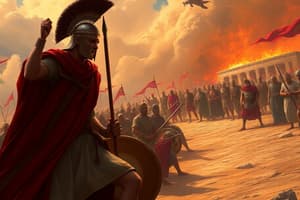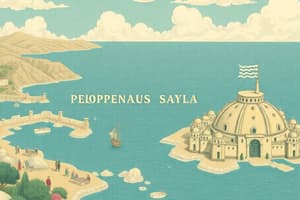Podcast
Questions and Answers
Which sea lies to the west of ancient Greece?
Which sea lies to the west of ancient Greece?
- Ionian Sea (correct)
- Black Sea
- Aegean Sea
- Mediterranean Sea
The Peloponnesus peninsula is located in the northernmost part of mainland Greece.
The Peloponnesus peninsula is located in the northernmost part of mainland Greece.
False (B)
What geographical feature contributed to the formation of independent city-states in ancient Greece?
What geographical feature contributed to the formation of independent city-states in ancient Greece?
mountains
The ________ civilization emerged on the island of Crete.
The ________ civilization emerged on the island of Crete.
Match the following geographical features to their descriptions in relation to ancient Greece:
Match the following geographical features to their descriptions in relation to ancient Greece:
Why were the Aegean, Ionian, and Mediterranean seas important to ancient Greeks?
Why were the Aegean, Ionian, and Mediterranean seas important to ancient Greeks?
Olive oil was only used for food and cooking in ancient Greece.
Olive oil was only used for food and cooking in ancient Greece.
What valuable discovery marked the Minoan civilization's royalty and governance?
What valuable discovery marked the Minoan civilization's royalty and governance?
The ______ civilization was known for its fortified sites and decentralized structure around 1400 BCE.
The ______ civilization was known for its fortified sites and decentralized structure around 1400 BCE.
Which of the following is a characteristic of the Mycenaean civilization?
Which of the following is a characteristic of the Mycenaean civilization?
The Dark Age of Greece was characterized by an abundance of written records and high literacy rates.
The Dark Age of Greece was characterized by an abundance of written records and high literacy rates.
Name one of Homer's famous writings that provided insights into the kings of ancient Greece.
Name one of Homer's famous writings that provided insights into the kings of ancient Greece.
_________ are tombs for rich people, characterized by a circular tomb chamber in a domed shape.
_________ are tombs for rich people, characterized by a circular tomb chamber in a domed shape.
What was the primary role of the 'Agora' in ancient Greek city-states?
What was the primary role of the 'Agora' in ancient Greek city-states?
In Sparta, women had no freedom and were confined to domestic activities.
In Sparta, women had no freedom and were confined to domestic activities.
Flashcards
Archipelago
Archipelago
A group of islands clustered together.
Peninsula
Peninsula
Land surrounded by water on three sides
Peloponnesus Peninsula
Peloponnesus Peninsula
Southernmost part of mainland Greece, surrounded by the Aegean, Ionian, and Mediterranean seas
City-state
City-state
Signup and view all the flashcards
Aegean, Ionian, Mediterranean Seas
Aegean, Ionian, Mediterranean Seas
Signup and view all the flashcards
Crete
Crete
Signup and view all the flashcards
Minoans
Minoans
Signup and view all the flashcards
Mycenae
Mycenae
Signup and view all the flashcards
Dark Age
Dark Age
Signup and view all the flashcards
Homer
Homer
Signup and view all the flashcards
Tholos
Tholos
Signup and view all the flashcards
Polis
Polis
Signup and view all the flashcards
Acropolis
Acropolis
Signup and view all the flashcards
Agora
Agora
Signup and view all the flashcards
Hoplites
Hoplites
Signup and view all the flashcards
Study Notes
- Identify the locations of Athens, Sparta, Mediterranean Sea, Aegean Sea, Ionian Sea, Crete, and Peloponnesus on a map.
- Cardinal directions of ancient Greece:
- South: Mediterranean Sea, northern coast of Africa including Egypt
- East: Asia Minor, Turkey, Middle Eastern countries, Aegean Sea
- West: Ionian Sea
- North: Albania, North Macedonia, Bulgaria
Archipelago, Peninsula, Peloponnesus
- Archipelago: A group of islands.
- Peninsula: Land surrounded by water on three sides.
- Peloponnesus Peninsula: Located in the southernmost part of mainland Greece and surrounded by the Aegean, Ionian, and Mediterranean seas.
City States
- City-states were close-knit and independent due to natural barriers like mountains hindering communication.
- The difficulty in communication helped unite Greece; they had a religious belief system and cultural similarities.
- The terrain consisted of independent political entities, each comprising a single city and its surrounding territory.
Aegean, Ionian, Mediterranean Seas
- These seas provided fishing opportunities and fertile land.
- They served as vital links between mainland communities and islands.
- Sea travel facilitated shared ideas and trade.
- Maritime activity led to powerful navies and a shared identity, but the sea could also trigger fears and tales.
Olive Oil Importance
- Food & Cooking: Primary ingredient in Greek cuisine for cooking and dressing.
- Skincare & Hygiene: Mixed with scented herbs for cleaning and moisturizing, an alternative to soap.
- Lighting: Burned in clay lamps, the main source of light in Greek households.
- Cultural & Religious Significance: Divine gift from Athena, symbolizing wisdom and prosperity.
- Economic Importance: A valuable trade commodity in ancient Greece.
Crete Island
- The Minoan civilization emerged here
- Discovery of Knossos which was used for kings. It had a complex design.
- It was home to rich culture that traded with Egypt and southern Greece
Minoans
- 2800 BCE, Bronze Age
- Established on Crete as a sea/trade empire.
- Named after Minos, the legendary king.
- Discovered by Arthur Evans, an English archaeologist.
- Marked by the Knossos palace, which featured a strict tax and government system
- Traded with Egypt and southern Greece
- Collapsed due to volcanic eruptions and Mycenaean invasions.
Mycenae
- 1400 BCE
- Fortified site in Greece divided into centers, representing a decentralized civilization.
- Indo-European family that entered mainland Greece.
- Ruled by a monarchy.
- Known for tholos tombs in the mountains, shaped like dome/beehive.
- Known as a warrior society, with a commercial network connecting it to the outside.
- Military adventures were written about by "Homer".
- Collapsed due to internal warfare and earthquakes.
Downfall of Civilizations & Dark Age
- Civilizations declined due to natural catastrophes and internal collapse/invasion.
- The Dark Age saw a decline in records, literacy, population, and food production.
Homer
- A poet that wrote about the war which featured characters like Agamemnon and Troy.
- Writings are known as the Iliad & Odyssey
- Invented a new writing system.
Aristotle
- A philosopher who stated that citizens belong to the state
Tholos
- Tombs for rich people with a circular, domed shape
Polis
- Greek "city-state" which became the center of Greek life which the origin of politics
- Was the city and countryside combined together
- It was at the center of political, social, and religious life as a community
- They were patriotic, nationalistic, and independent
- The city had a strong military system
- Citizens had political rights but this was only for adult males
- Women and Children had no rights
- Slaves and resident aliens were non citizens
- Rights came with responsibilities
- The city had no trust between each other
- There was no individualism
- Military and strong
- They were hierarchical
- Aristocrats are land owners
- Hoplites were foot soldiers
- The military was based on the phalanx formation
Acropolis
- Located on top of a hill, fortified, provided safety during war, and served as a religious center
Agora
- Located below the hill and was a market place for normal people
- Occupied by women because all men served in the military
Helots
- Captured people who were now Spartan military
Hoplites
- Foot soldiers
Phalanx
- The formation the soldiers used
Aristocracy
- Land owners and rich people
- Occupied the highest rank in social structure and the military
- Solon, Pisistratus, and Cleisthenes were aristocrats
Sparta
- Located on the Peloponnesus peninsula
Sparta's Government
- Oligarchy: Headed by two men
- Council: 28 "elder people"
- Assembly: Made up of male citizens who only voted
- Had a controlled environment
- Foreigners and the population were discouraged to learn
- Military state with a strong need for land, invaded to acquire more
Sparta's Social Structure
- Boys: Joined military school at 7, lived in Barracks at 20, left at 30, and could vote at 30, and stayed in the army until 60
- Girls: Stayed at home and were healthy, had freedom and power, remained fit, and raised children
Athens
- Located on the Attica Peninsula
- Government:
- Early on was a monarchy led by aristocrats
- This became a political turmoil and the aristocrats fought farmers which led to civil war and farmers being sold into slavery
- Early on the government was controlled by the leading class and owned the most land
- Solon an aristocrat came into power that canceled slavery and debts
- Pisistratus: Aided Athenian trade so merchants would like him and gave aristocrat's land away so he was favored.
- Cleisthenes: Founded democracy
Athens Social Structure
- Purpose of education was to make rounded individuals
- Boys:
- Boys in the upper class had a pedagogue
- Each boy had 3 teachers that taught reading, writing, arithmetic, physical education, and music
- Girls:
- From all Classes, stayed at home and remained at home
Pedagogue
- Slave that had the role of teaching boys morals
- Would take responsibility and punish if needed
Monarchy
- Led by a single individual and held supreme authority
- Mycenae was a monarchy led by a Wanax (king) such as Agamemnon
- Featured long term leadership and planning
Oligarchy
- A rule led by a few "aristocrats" driven by self interest
- Power was in the hands of an elite group
- Changed from monarchs because the king became weak
- Athens: An oligarchy that prevented absolute power from going to a single person
- Gerousia: Sparta's 28 council of elders
- Ephors: Five democratic officials in Sparta that had power over the king
- Had enslaved workers with no rights called helots
- Featured more checks and balances more education and experience
- Negative side include: Self interest, internal conflicts, and bigger social division
Tyranny
- A person seized power through support from the population
- They would take advantage of citizens because they were dissatisfied
- Were dictatorships
- Pisistratus used forceful methods that would still implement and reform the government
- Hippias was very cruel and would hurt his political enemies
- Thalassocracy = sea empire for trade
- Cypselus of Corinth overthrew the oligarchy and made it a powerful empire
- It was a brutal government that was only temporary
Democracy
- Flourished in Athens
- Was the most revolutionary experiment of the Greek political experiment
- Demos Kratos means power to the people
- Solon and Cleisthenes were examples which addressed inequality and broadened more political participation
- Pericles: Saw the height where citizens served juries, were elected official and participated in daily political life
- Ekklesia: Central governing body, voted on laws, elected officials, ensuring more voices were heard
- Boule: Council of citizens in Athens
- Isonomia: The idea the all citizens were equal
- Ostracism: Where citizen exile anyone deemed to be a threat to democracy
- Pros: Equality
- Cons: Exploitations through propaganda, minorities are left out, exclusive democracy
Studying That Suits You
Use AI to generate personalized quizzes and flashcards to suit your learning preferences.




